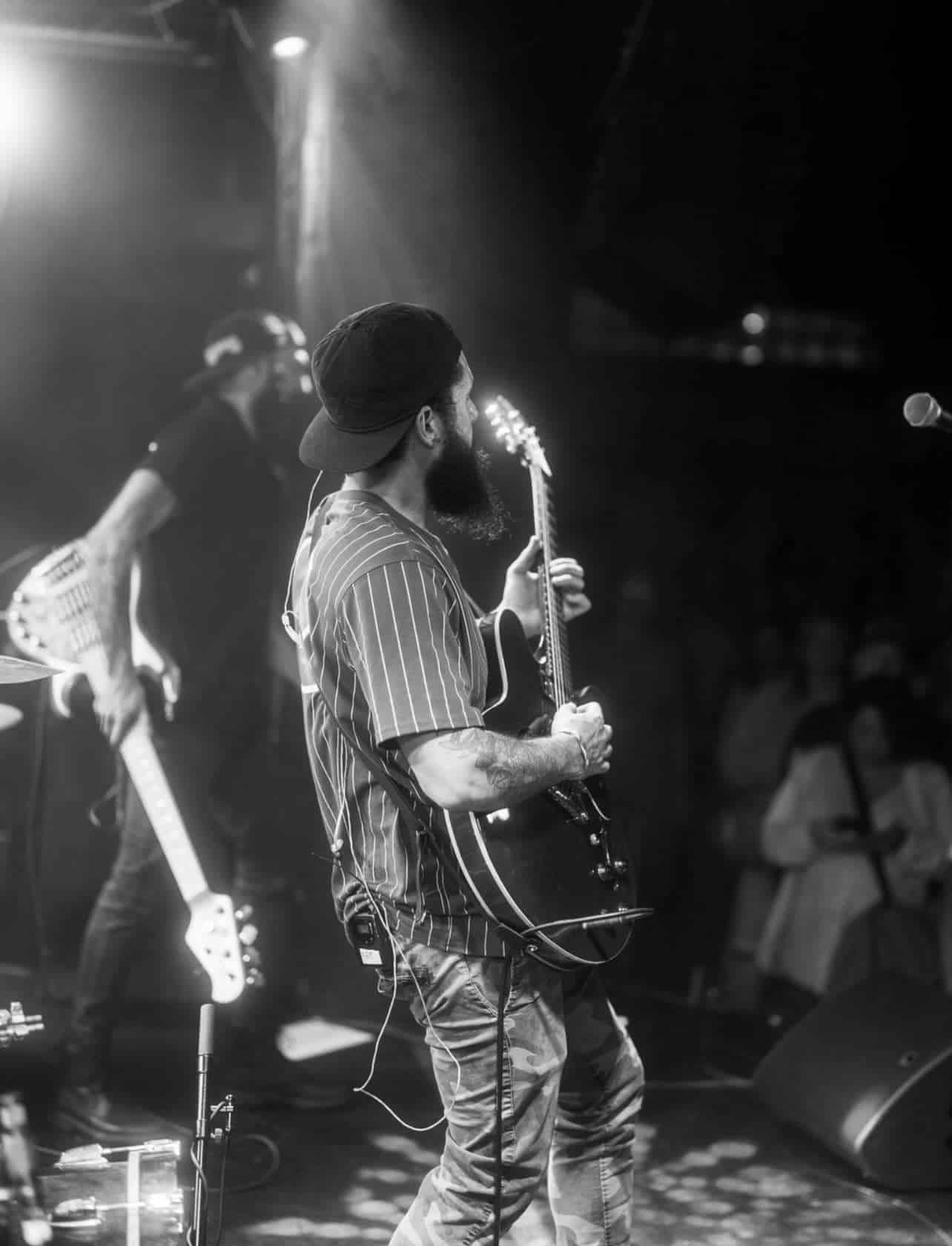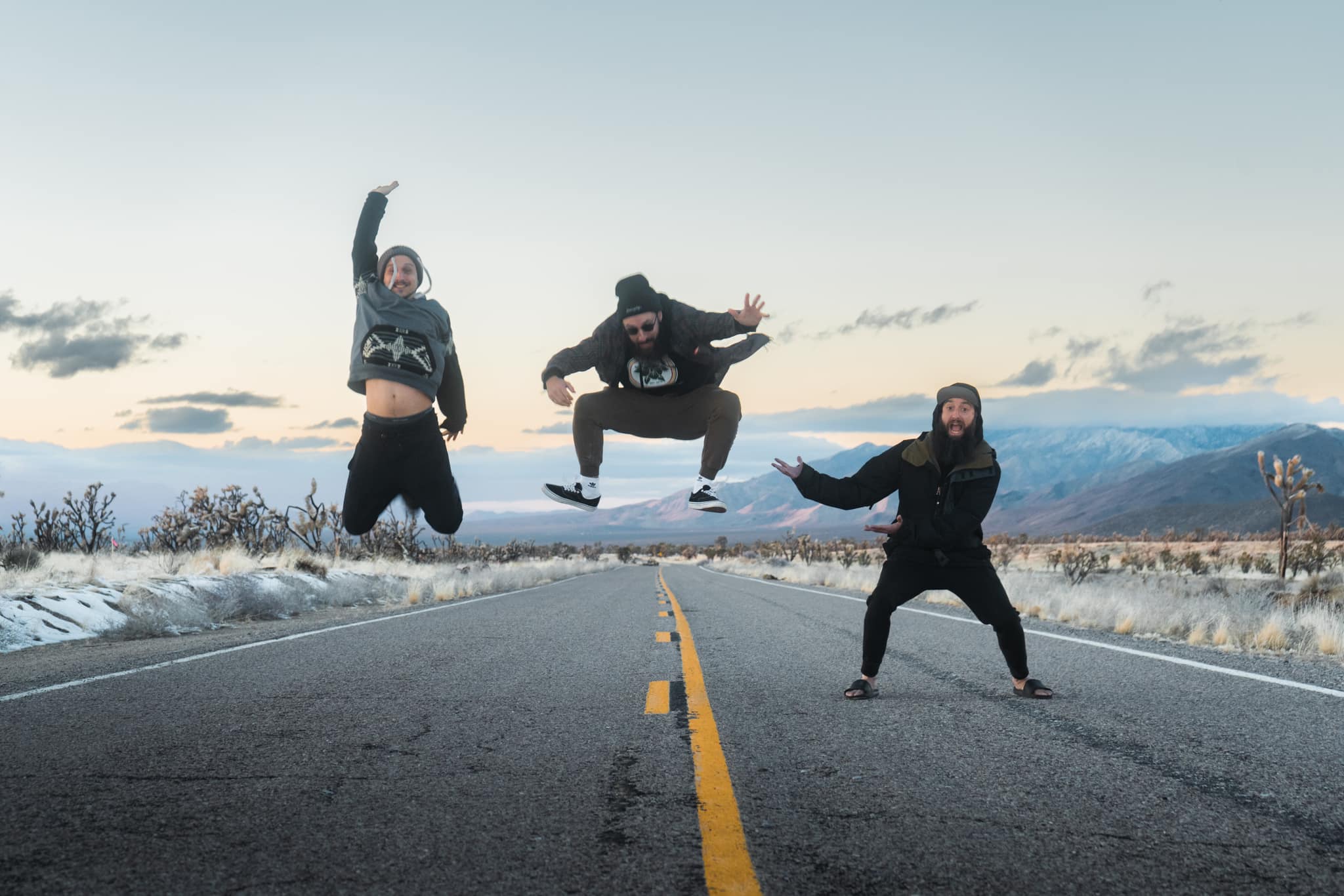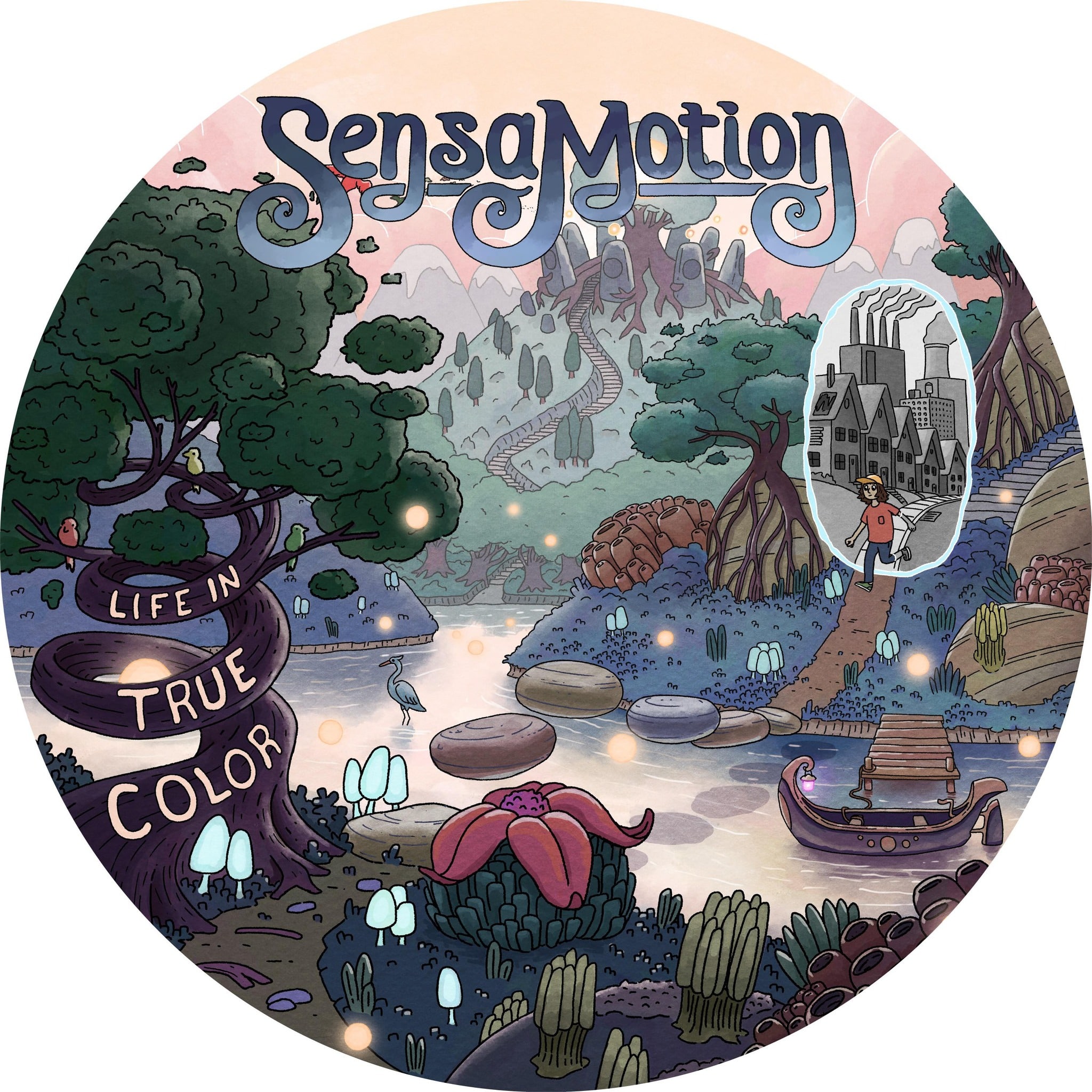Around the turn of the century, my buddy opened a burrito shop at the end of my block in Montclair, NJ, called One Phunky Burrito Joint. I ate there multiple times a week. The place had snowboards and skateboards fashioned into tables and counters and great tunes always pulsating from the sound system, including a lot of reggae music courtesy of yours truly. With these kinds of vibes, the establishment grew to become a beacon for local teens and 20-somethings, many of which were students at the local Montclair State University. Naturally, these young adults also made up the staff, and one of them, knowing how much I loved reggae, introduced me to his former band operating out of the Atlantic City area called Sensamotion.
The two remaining original members, drummer Mike Crosson and bassie Ray Worrick, have been making music together under the Sensamotion moniker since high school. As teenagers, they had gravitated toward reggae music because of the positive message put forth by artists like Bob Marley and Steel Pulse. Ultimately, however, Crosson cites American bands John Brown’s Body and Groundation as primary inspirations and influences during their early days. “They brought so much energy to the stage that really caught our attention,” said Crosson. “I could definitely say going to those shows really helped develop our sound as a band.”
Notably, it was another American reggae band from closer to home, Jah Works, that mentored Sensamotion during their formative years. The guys met members of the band while attending a Year’s Eve performance in which Jah Works had opened for SOJA in their hometown of Baltimore. “Jah Works was definitely a huge influence back in the day,” Crosson recounts. “In particular, me and Ray connected a lot with the drummer, Johnny Pang. He helped us understand the idea of the one drop and its important role in reggae music. We are still close friends with Johnny and the whole crew till this day!”
Over time, through local gigs and supporting work for nationally touring artists that came to the area, the band developed a stellar fanbase around their Jersey shore home. Then, with this solid footing, after opening for South Bay, Los Angeles, band Fortunate Youth and San Diego’s Tribal Seeds in Asbury Park, Fortunate Youth recruited Sensamotion to support them on multiple tours in 2015. This amazing opportunity abetted the band’s exposure exponentially, while giving them a true taste of life as touring musicians.
“They had reached out to us to help to a few shows down south, which led to doing a whole spring and fall tour with them,” Crosson remembers. “This was definitely a big game-changer for us. It really helped open our eyes to what touring is all about. Watching how a band like Fortunate Youth handles certain things like merch, set creation and all that was a big learning experience.”
The path to success for professional musicians is often neither swift, continuous nor linear, however, and through the years, the band has had to endure numerous personnel changes, which unfortunately derailed their upward momentum to some degree. Eventually, Crosson and Worrick found themselves at a crossroads. Ultimately, though, after some soul-searching, the duo stayed the course. “Ray and I decided we would keep Sensamotion going any way we could. There was so much time and love put into the project that we couldn’t just let it go.”
Enter guitarist, singer and producer, Art Rivell, the driving force behind Sensamotion’s fantastic 2022 album, Life in True Color.
Rivell grew up in the Pennsylvania suburbs of Philadelphia. Inspired by his mother’s guitar playing, Rivell picked up the instrument himself for the first time in elementary school. As a youth, he had been exposed to reggae through his parents’ listening habits, often hearing the music of Bob Marley and Jimmy Cliff around the house. While in high school, a friend introduced him to Rebelution, who really resonated with him, but it wasn’t until his sophomore year of college in 2012-13 that he began to really dive into reggae scene.
He had come across The Green online, presumably from YouTube or Pandora and was “sucked in” by “their island sound and harmonies.” He went to see them play when they came to Philadelphia, and his first reggae show really solidified his love for reggae. “The bass, the drums, the dancing, the positive message of the music had me in its grasp,” Rivell recalls.
The Green had been supported by Kimie and a local opener, none other than SensaMotion. “My first reggae show just happened to have a band that I am singing for,” he marveled. “Pretty wild.”
The universe works in mysterious ways, no doubt, further evidenced by Rivell’s circuitous path to actually joining the band.
He quickly became a fan of SensaMotion after that show and started attending their other local shows in the Philadelphia and Atlantic City areas, becoming familiar faces in the scene. Their original guitar player ended up leaving the band and a mutual friend recommended Art for the job. However, they ended up enlisting a gifted local named Kyle Ahern, who after a stint with Sensamotion, would eventually join Rebelution at the major league level.
Rivell did his own thing for the next couple of years, playing in other local reggae-jam bands as a bass player. Then, in 2018, the original singer of SensaMotion, Joe Collepardi, recruited him to play guitar for a tour supporting two uber talented California reggae bands, Dubbest and The Expanders. Rivell could only commit to that tour and nothing beyond, however, as he needed to finish up his college degree at the University of the Arts.
A year later, SensaMotion went through some inner turmoil, which led to Collepardi going his own way. Crosson and Worrick had seen Rivell sing some covers on YouTube and Instagram and decided to give him a try singing for the band for their summer casino gigs in Atlantic City. Halfway through the summer, having seen (and heard) enough, they invited Rivell to be a permanent member of the band.
Buoyed by their new partnership and eager to showcase their new sound, the musicians went to work, recording a new single titled “Truth and Discovery,” which they released in 2020. The band continued to write music in the comfort of Rivell’s home studio, with Rivell producing, which would eventually be released as the Life in True Color LP last summer.
“When it comes to songwriting, we don’t really have any specific roles,” said Rivell. “I do most of the lyric writing, but Ray and Mike also have a hand in the lyrics on the songs if they hear something. If someone has an idea, whether it be lyrically or musically, we try to foster a healthy creative environment. It’s rare that I write a song on my own. We really are a team when it comes to that.”
Rivell said the music usually comes first before the lyrics. “I rely heavily on the music to influence what gets written on our songs. It’s all about how it’s making me feel at that instant.”
This collaborative approach served them well, in addition to having the luxury of recording at Rivell’s home studio. “There was absolutely zero pressure,” said Crosson. “We just felt at complete ease and everything just felt super comfortable for us all.”
The band also credits renowned producer E.N Young, who mixed and mastered Life in True Color from his Imperial Sound studio in San Diego, with helping them create the sound they were going for. “Besides the magic touch he has for mixing and mastering, he also helped contribute to producing parts of the songs that really brought them more life,” said Crosson.
Rivell added, “E.N was incredible to work with. His knowledge and experience really shine with his craft, and that was clear with the final cut of our album. He really understood our vision and became a mentor to us not just musically but as a band/business. He really crushed what we were aiming for and helped polish our product.”
That product, Life in True Color, is a fantastic album, one of my favorite releases of the past year. Some reggae albums, such as most work by The Slackers, for example, feature a mix of different styles and tempos. This approach has merit as it keeps listeners engaged and offers something for everyone. Conversely, Life in True Color remains pretty consistent throughout its 12 songs and 45 minutes. This is important for a band that is reintroducing themselves to fans and reinventing their sound to some degree. Additionally, it makes the perfect choice for listeners who are seeking a certain vibe.
Sensamotion’s music is upbeat yet not aggressive, uplifting, comforting and a bit dreamy. It achieves an uncommon balance that makes it a strong accompaniment both to physical activity such as surfing, snowboarding or biking as well as more relaxing pursuits like getting a massage or chilling by the fire.
(Speaking of getting a massage, anecdotally, I have a masseuse that I have been working with over the past seven years or so. For each session, I hook up to her Bluetooth JBL speaker to play the music of my choice, always choosing something relaxing to match the soothing physical sensations, such as this downtempo playlist that I made years ago called A Pale Blue Dub. During a recent session, I played Life in True Color, and it was the first time after dozens of massages that my masseuse asked about the music because she liked it so much.)
Lyrically, Life in True Color is less direct and overt, more opaque and poetic. Obliging my wish to dig a bit deeper, Rivell generously pulled back the curtain to reveal some of the inspiration and meaning behind the music.
The main themes of the album seem to be resilience, perseverance, and encouragement, as if the narrator had just gone through hell yet survived and has now turned a corner and can see the light at the end of the tunnel. “Definitely a fair assessment,” Rivell agreed. “I think our primary goal for the album was to hit on shared experiences we all have — the human element/condition — however you want to slice it. I really wanted the album to portray self-growth and finding your own truths through curiosity, love, and experiencing hardships. Life in True Color as an album is about seeing things as a whole!”
The album opens with breezy acoustic guitar licks which immediately set a cheerful tone for the first track, “Take It Easy.” The song serves as a mantra for someone who may be overly critical of themselves, or perhaps carries guilt for past transgressions. “The main push with that song is how easy it is to get caught up in things in life that seem so big, and no matter what life throws at you, to be kind and authentic to yourself,” Rivell expanded. “I read something one time that I like to pair up with this song. Take a tiny stone and hold it near your eyes. It would seem big enough to block your vision of anything else other than that. So, similar to your eyes, your brain can’t focus on anything else except the problem, which in reality is small, but because you are holding it so close to your thoughts, it makes it seem bigger. So, the main takeaways are to try to look beyond what’s in front of you and look at the bigger picture.”
When asked if there were any pivotal events in his life that fueled his lyrics or if he took inspiration from what is happening in the world and/or life in general, Rivell used the title track to provide an example of how his creativity manifests itself. One late summer evening, he was waiting for Worrick and Crosson to arrive at his house on their return from a trip to Acadia National Park in Maine. To pass the time, he busted out a rickety old telescope that his parents had bought back in the early 90s. “Somehow, by some miracle,” he managed to find Saturn in the scope just as his bandmates were pulling up to the house.
“It was a crystal-clear night,” he recalled. “The three of us sat in my front yard in the dark looking at Saturn and its ring in amazement. There’s something called the ‘overview effect’ which is experienced by astronauts viewing earth from space. It’s basically a state of awe with self-transcendent qualities. Anyway, I had a transformative moment that night just staring up and feeling very connected with everything and everyone. ‘Life in True Color’ is one of my favorite songs I’ve ever written for this reason and why I always like to take inspiration from not only what’s happening in front of us but also in the bigger picture.”
This idea also contributed to the band’s decision to name the album after the song. “This track really felt like it encapsulates the other songs,” Rivell explained. “All of the other events that take place on the album exist within the universe of the title track, metaphorically of course.”
Rivell pointed out that the album starts off from an individual perspective with “Take It Easy,” then navigates to group perspectives with “Thank You” and “Better Days.” He said that “Life in True Color” felt like a “universal perspective” which seemed like a good fit to represent the whole album.
Speaking of “Better Days,” it is one of two tracks on the album enhanced by the presence of brass, courtesy of brothers Rick and Frank Rein, buddies they met from Philadelphia reggae band Kings and Comrades. Rivell said that, initially, the band wanted a lot of horns in the album “because of that extra element they bring to songs,” but ultimately, since they don’t have committed horn players at the moment, they decided it would be better to “stay a little more true to our album sound in a live setting.”
“Better Days” also features another element that is used fleetingly in the album – a synth – which adds a dynamic aspect. “I have to give E.N Young credit for some of those synth textures,” said Rivell. “I know he added them in on a couple of songs in spots that just needed a little something extra. He’s got a really good grasp on production and what songs need. The guys and I are big fans of creating a scene, so to speak, of texture and layered sounds. Whether it’s guitar, synth pads, big washy reverbs. It’s all about the atmosphere.”
While the entire album flows continuously with enjoyable music, certain tracks stand out as exceptional. One such song, “All That I Want Of,” also happens to be one of Rivell’s favorites. “It’s a very personal song for me about reaching for your dreams and stopping at nothing to achieve your goals,” Rivell commented.
He spoke of how the band recently bought an RV and drove across the country, and along the way they shot a music video for the track with their good friend and “camera guy,” Josh Case. “I really felt like we were doing what we believed in and following our dreams. Also, added bonus, when we stopped in Florida, I got to see a girl I was talking to and am dating now, so the song is very special not only for that trip but has an added element in reaching for what you want in life. I think that’s just a little nugget that helped solidify that song’s spot in my personal hall of fame.”
Rivell admitted that his lyrics can be a little cryptic at times. When asked to comment on the track, “Truth and Discovery,” which appears to make reference to those who kill in the name of religion, he said it is about “staying true to yourself and finding out /discovering your own truths.”
Continuing, he said, “In a world where we have weaponized religion, politics and news, the song is a reminder to ourselves and others to stick to your guns.” He cites a line in the first verse: “False prophecies circling me, mind mixed up, but I know I gotta stay…” (true to myself and find my own truth.)
While much of the messaging of the album revolves around self-reflection and growth, two tracks, “Thank You” and “The Road,” pay homage to touring while expressing gratitude to the fans that the band encounters on the road.
Rivell agreed that the two songs are very closely related, revealing that “The Road” was inspired by his experiences on his first tour with SensaMotion, which had been the first time he had ever played outside of the PA, NJ and NY area. “It was such a profound experience in my development professionally as well as personally. It made me realize that I love being on the road playing music — the camaraderie, the fans, seeing new places and meeting new people. I felt home.”
“Thank You” piggybacks on those sentiments. “Without the love and support of all of our fans and fellow musicians, we wouldn’t be able to do this thing that we all love so much. For that, we will be forever grateful, and never take for granted our experiences and people that come in and out of our lives. It’s a beautiful thing.”
Next Friday, April 21, Sensamotion will be releasing a new single featuring E.N Young titled “See the Good.” Additionally, Sensamotion will be joining Rootfire for a Life in True Color listening party/Q & A on the Rootfire channel on the Stationhead app on Tuesday, April 18, at 8pm ET.



